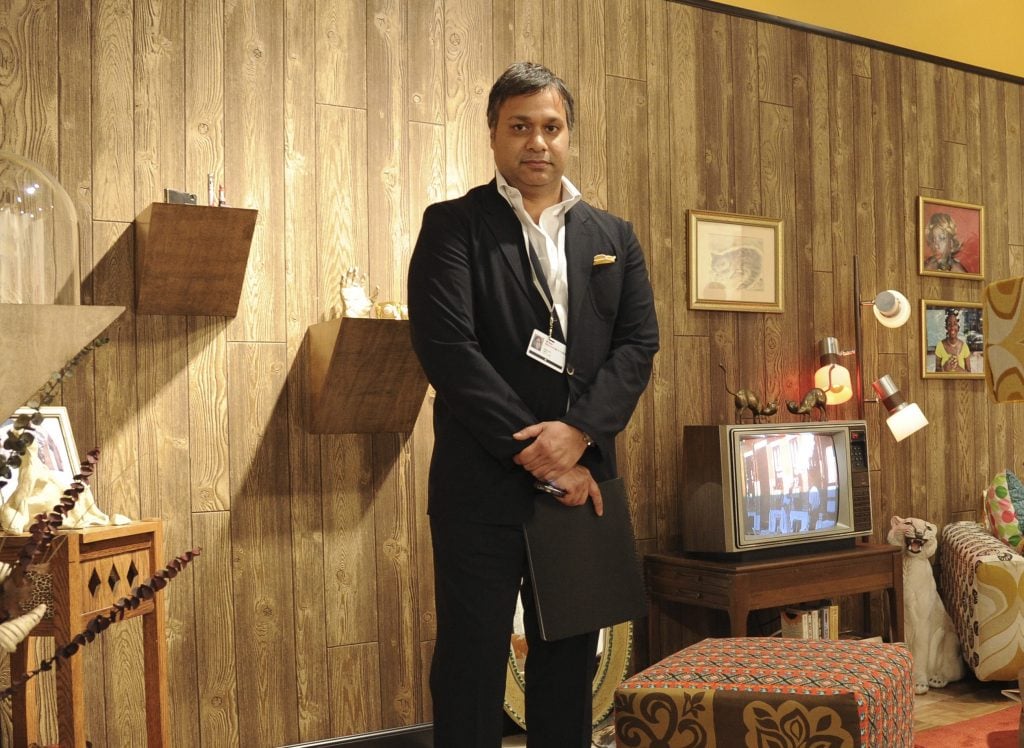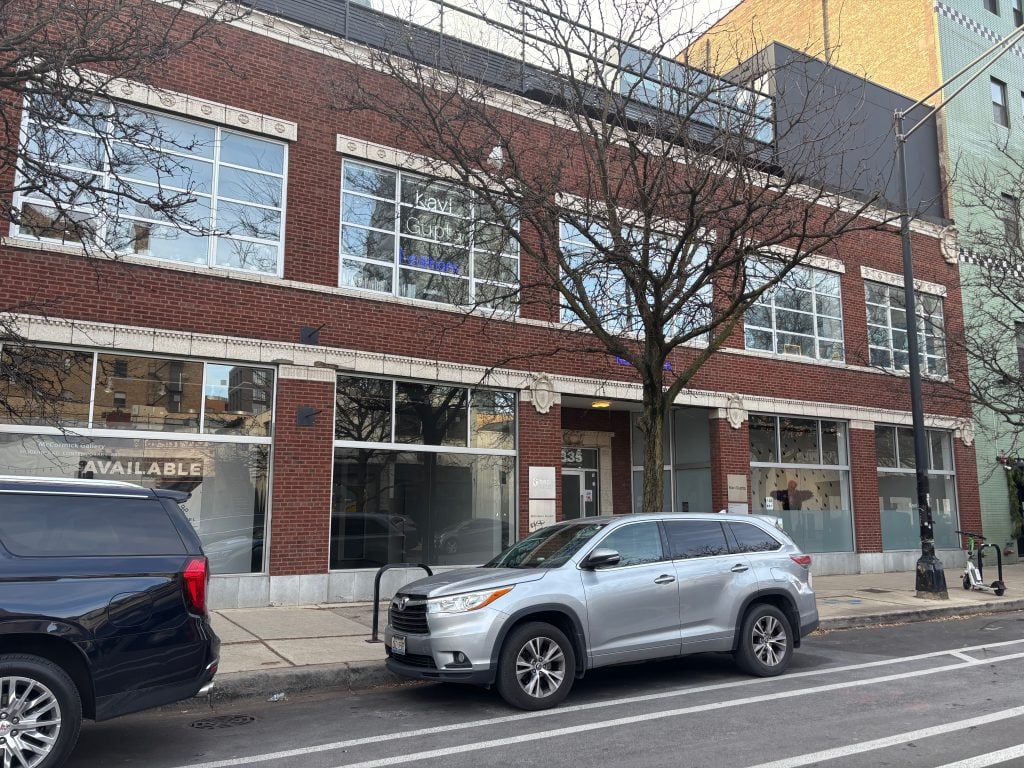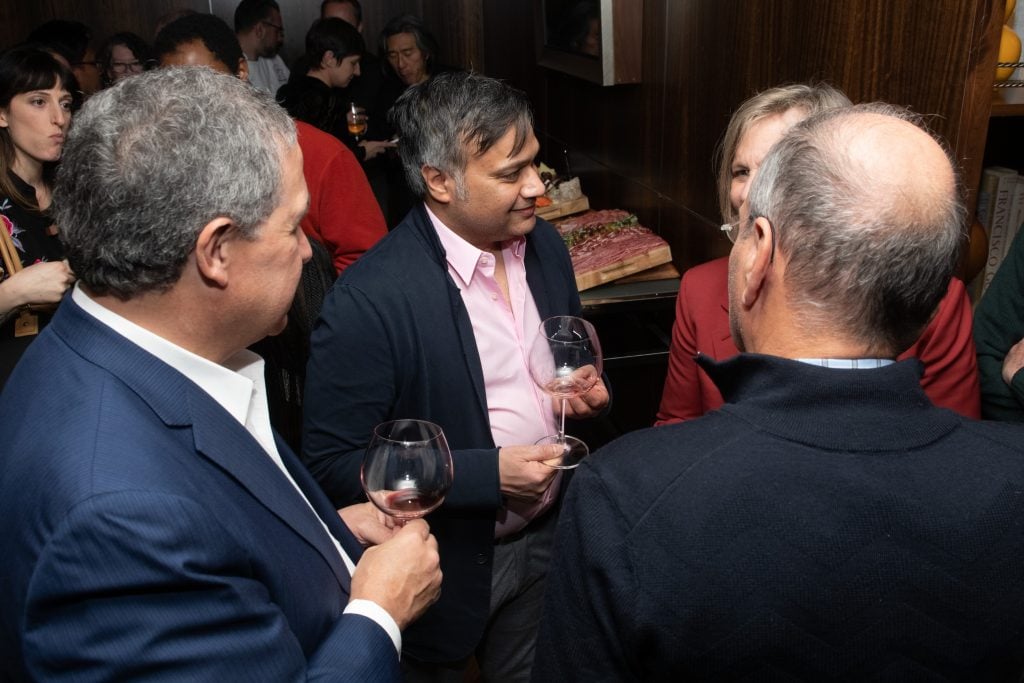Art World
The Rise and Fall of Kavi Gupta: Chicago Dealer Faces Lawsuits, Claims of Mismanagement
Artists who his gallery championed became stars, but now the firm is in trouble, insiders say.

Artists who his gallery championed became stars, but now the firm is in trouble, insiders say.

Brian Boucher

Not so long ago, Chicago dealer Kavi Gupta was a force in the international art world. Artists on his roster appeared in top international exhibitions, like the Whitney Biennial, Documenta, and the Venice Biennale, and he regularly had booths at leading art fairs. His shows won awards from the International Association of Art Critics. His home, above one of his galleries, was the subject of an Architectural Digest feature, filled with work by artists he championed, like Nick Cave, Theaster Gates, and Mickalene Thomas. His former directors went on to found their own successful galleries.
More recently, though, Gupta’s business has been struggling. His staff has shrunk, as has his artist roster, and people close to the gallery say there are serious financial issues, with both employees and artists going unpaid for various stretches. He is dealing with two lawsuits—one against his gallery and one against him that has not been previously reported. His gallery’s main location is now open only by appointment, after “a ‘Tsunami’ of weather-related disasters,” including water damage that affected electrical lines and tornado damage to the roof, according to a since-deleted December 10 Instagram post. One recent exhibition stayed up for five months, far from the standard four- or five-week turnaround for a gallery show.
Gupta declined to be interviewed for this story, referring questions to a lawyer, Vivek Jayaram. He has not been found liable for anything in the two ongoing lawsuits or accused of any criminal wrongdoing. Many people with direct knowledge of goings-on at the gallery in recent years also declined to be interviewed, for fear of retribution from Gupta, but eight were willing to speak on the condition of anonymity.
One sign of trouble appeared in August 2023, when artist Jeffrey Gibson, the first Indigenous artist to represent the United States solo at the Venice Biennale, filed suit against Gupta’s gallery. A former member of its roster, Gibson alleges that he was not paid almost $640,000 in sales proceeds. Responding to the complaint, the gallery said that those funds were used to cover production expenses, as stipulated in their contract. (The “exhibited artist and available works” page of the gallery’s website still lists Gibson.)
While galleries allegedly failing to pay their artists in a timely fashion is not entirely uncommon, lawsuits are fairly rare, and a suit against such a prominent gallery by such a boldfaced name is unusual.
In June of last year, a second lawsuit arrived, this one from dealer Thomas McCormick. He and Gupta co-own the building that houses Gupta’s main location, at 835 West Washington Boulevard. (McCormick had a gallery there, too, but moved to the West Town neighborhood in July.) His complaint says that the dealers refinanced a loan on the property in 2019, obtaining $2.5 million, and that Gupta instructed the lender, Wintrust Bank, to deposit $780,000 of the funds into his account, allegedly without informing McCormick. The complaint alleges that Gupta used the money to remodel and rehab his living space above his gallery.
McCormick claims that Gupta has fallen behind some $45,000 in rent for the space he uses in the building. As a result, the LLC they created that owns the building has been unable to keep up on property taxes, leading Wintrust to allegedly send notices of default on the loan, which is personally guaranteed by the two men.
The complaint seeks an accounting of Gupta’s actions as well as punitive damages to be determined at trial. A McCormick Gallery staffer said the dealer was not available for comment.
Gupta’s lawyer, Jayaram, said in an emailed statement that the dealer “denies all of Mr. McCormick’s allegations, and looks forward to showing the court the litany of mismanagement and wrongdoing in which Mr. McCormick engaged, and which is comprehensively outlined in the filings. Kavi is also hoping for a quick and amicable resolution so he can return his focus to bringing top tier contemporary art and diverse voices to communities around the world.”
These do not appear to be Gupta’s only alleged real estate woes. According to the property tax portal for Cook County, which is home to Chicago, his gallery at 219 North Elizabeth Street has taxes outstanding in the amount of $47,000 for 2023, and a warehouse at 2108 South California Avenue has more than $21,000 outstanding for 2023. (Gupta has a fourth location, in New Buffalo, Mich., listed on his website, but only the Washington Boulevard space has been active of late.) Jayaram did not respond to an email requesting comment on these debts.

The building at 835 West Washington Boulevard that houses Kavi Gupta Gallery.
Hopeful Beginnings and Great Heights
Born in 1969 to an art-collecting family, Gupta opened his eponymous gallery in 2000 in the Windy City’s West Loop neighborhood after briefly running a gallery under the name Vedanta. The former investment banker was among the first dealers to set up shop in the formerly industrial neighborhood, now home to a Soho House location, a Nobu hotel and restaurant, Michelin-rated eateries, and other dealers.
The gallery expanded to Berlin in 2009 (the last exhibition there that is listed on his website closed in 2014). He bought his second Chicago space, 219 North Elizabeth Street, in 2013 for $550,000 in cash and planned to spend an additional $200,000 on renovations. “The gallery has been doing incredibly well and we’re at a point when we could finance it on our own—we didn’t need any banks,” Gupta told the Art Newspaper, adding, “It’s kind of scary.”
Gupta’s artists received lavish treatment from him—rooms at Nobu when they were in town, lavish parties, and luxurious gifts. Exhibiting at the Armory Show in New York in 2015, he flew in celebrated Chicago chef Michael Kornick (“one of Chicago’s true culinary masters,” according to Esquire) to serve Maine lobster sandwiches and Dover sole, along with rosemary-and ginger-infused martinis.
In a 2018 interview, Gupta boasted of his support for ambitious projects, like a 5,000-square-foot installation by Roxy Paine and an 80-foot-long Tony Tasset work that was in the 2014 Whitney Biennial. Gupta noted that he had writers on staff, fueling a publications program that partnered with DAP, Phaidon, and others, and that some of his employees were devoted full-time to PR for specific artists.
The 2021 Architectural Digest profile of Gupta’s home highlights 14-foot walls, an outdoor terrace, and works by artists like Nick Cave, Beverly Fishman, Sam Gilliam, Deborah Kass, Angel Otero, and Jessica Stockholder. The property had undergone a full-scale demolition and “reimagining” by the local firm Jonathan Splitt Architects. (This is the remodeling at the heart of McCormick’s suit.)
“Gupta got an entire room for his wines,” the article says, noting that he uncorked three bottles for the writer’s visit. His wife, art historian Jessica Moss, told the writer that her husband often opted to work at the dining room table so that he could be near his wine.

Kavi Gupta and friends at Kavi Gupta Rare Wine & Cocktail, Armory Soirée at WestHouse Hotel on March 7, 2019 in New York City. Photo: Michael Ostuni/Patrick McMullan via Getty Images.
Allegations of Non-Payment and Broken Promises
The gallery’s apparent struggles come amid a moment of profound challenge for many in the art market, and it is hardly the only business coming upon tough times. COVID-19 was a brutal blow for numerous dealers. Many expenses rose after the pandemic—shipping costs, for example, went through the roof—and never came back down. In the last two years, galleries have been going out of business in large numbers, from Los Angeles to New York.
But many who spoke for this article said that the issues at the gallery went beyond macroeconomic headwinds, and shared concerns about dysfunction and erratic behavior on the part of Gupta that occurred during periods of heavy drinking. Gupta and Jayaram declined to comment on any of the allegations detailed here.
Five people with knowledge of the situation alleged that Gibson is not the only artist who has payment issues. One said, “I can’t think of a single artist that got timely payment.” (This issue was recently reported in an Observer story.)
Two staffers said that they dreaded artists finding out their works had sold, because staff then would have to struggle to get the artist paid. Artists have had trouble getting their works back from the gallery after splitting with it, or have learned of works being offered for lower prices than they had agreed, according to four people. Gupta would promise to cover fabrication costs or artists’ studio rents, according to three interviewees, but then take those sums out of the amount he paid them.
On at least one occasion, according to three sources, employees’ health insurance coverage lapsed due to non-payment by the gallery.
Art fairs were also sometimes shorted, according to two people with direct knowledge of the situation. They said that staff would show up at fairs and not be allowed to enter until the gallery’s fees were paid. The gallery has become a much less visible presence on the fair circuit. The gallery’s last appearance at Art Basel Miami Beach, for instance, was in 2022, after an uninterrupted run of more than a decade. An Art Basel spokesperson said via email, “As a general policy, Art Basel doesn’t comment on exhibitor applications or private client information.”
It is difficult to say precisely just how much the gallery’s roster has shrunk, but an archived page from spring 2020 on the Art Dealers Association of America website lists some 34 artists as “represented.” (The gallery is no longer a member.) Its website currently lists 26. Among those who are no longer listed, along with Gibson, are Firelei Báez, Beverly Fishman, Deborah Kass, Suchitra Mattai, Clare Rojas, Tony Tasset, and Kennedy Yanko. (Some of those names do appear in the “works available” section.)
Gupta had a staff of about a dozen a few years ago, sources said. The “current senior team,” the gallery website indicates, consists of Gupta; an operations manager and head registrar; and a senior gallery administrator tasked with exhibitions and client management.
A September 2024 Facebook post by Gupta from shortly after the Armory Show alluded to dark developments, reading in part, “I am personally thankful for those who reached out to help me [without my] needing to even ask.”
More recently, an Instagram post that the dealer made on his private, personal account during the Democratic National Convention in August in Chicago described the event as uplifting, despite “the Greek tragedy that has been my life for the past year.”